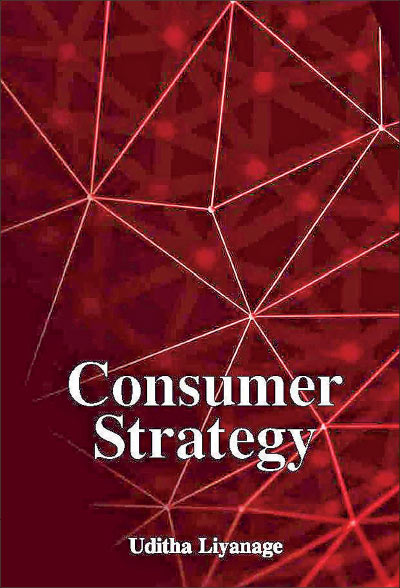Sunday Feb 15, 2026
Sunday Feb 15, 2026
Monday, 4 August 2025 00:36 - - {{hitsCtrl.values.hits}}

Prof. Uditha Liyanage
 Time has flown so rapidly. It has been 10 years since the demise of Prof. Uditha Liyanage, my mentor. He was a sage of our age, in touching many minds as a marketing maestro, left us on 10 August 2015 at the age of 61. There was a valued volume titled, “Consumer Strategy,” published posthumously containing myriad thoughts of my mighty mentor. Today’s column is a reflective revisit of his contributions.
Time has flown so rapidly. It has been 10 years since the demise of Prof. Uditha Liyanage, my mentor. He was a sage of our age, in touching many minds as a marketing maestro, left us on 10 August 2015 at the age of 61. There was a valued volume titled, “Consumer Strategy,” published posthumously containing myriad thoughts of my mighty mentor. Today’s column is a reflective revisit of his contributions.
Overview
The Postgraduate Institute of Management has posthumously published his final contribution, “Consumer Strategy” in 2016. We renamed the PIM library as “Prof. Uditha Liyanage Memorial Library” in honour of him. In August, 2019, we launched “Prof. Uditha Liyanage Memorial Oration” as a biennial event. My attempt is not to repeat his accolades but to reflect on his renderings of brilliance.
I still recall how the alumni of the Postgraduate Institute of Management (PIMA) together with the Sri Lanka Institute of Marketing (SLIM) and the Chartered Institute of Marketing (CIM) organised an event that revolved around the book, “Consumer Strategy,” a collection of articles by Prof. Liyanage published posthumously. After a brief recollection of reminiscent memories of Prof. Liyanage by Dr. Wickrema Weerasooria, Deepal Suriyaarchchi provided a comprehensive review of the book. Next was a panel discussion featuring Eardley Perera, Dr. Asanga Ranasinghe, the current Director of PIM, and me, as the then Director of PIM. It was heartening to see my idea of a collaborative event involving PIMA, PIMA, SLIM, and CIM becoming a meaningful and memorable reality.
At the panel discussion, I mentioned that I am not competent enough to comment on this masterpiece and suggested offering a non-marketer’s perspective. Ironically both me and Dr. Asanga Ranasinghe (then President of CIM) were in the same MBA batch of PIM, being students of Prof. Liyanage. On the other hand, Eardley Perera, who needs no introduction had been a teacher of Prof. Liyanage in the MBA program of PIM.
Deepal in his emotional thought sharing identified Prof. Liyanage as a marketer, strategist, leader, and a philosopher through his writings in the book. He meaningfully linked the contents of the book to the cognisance of Prof. Liyanage’s life. It reminded me the way I wrote the forward to the book stating that “Consumer Strategy” is a compilation of comprehensive articles written by perhaps the most conceptually rich person I have ever met. His ingenious ideas have immensely inspired us, in inviting us to be intellectually enriched and interactively engaged. I am glad that I had the privilege of being mentored by him but indeed sad that it could not be continued.
The 20 articles contained in this volume are all selected by Prof. Uditha Liyanage himself some time ago. They cover a wide range of topics in the broad domain of management, with specific emphasis on marketing and strategy. The depth of conceptual appeal and the breadth of concrete application appear as the hallmark of the veteran author. Variety of valued marketing models developed by Prof. Liyanage is included in this volume, inviting the readers to think afresh, instead of blindly transplanting the western marketing models. Similar is true for strategy as well.
We were keen on launching Consumer Strategy together with a felicitation ceremony for this fascinating human being. Destiny decided otherwise. Nevertheless, Prof. Uditha Liyanage the author will continue to be alive in our minds through his myriad insights. We at PIM committed ourselves in carrying his legacy forward. Publishing of Consumer Strategy and jointly organising an evening event to discuss the contents of it are significant steps in that solid endeavour.
 Contents revisited
Contents revisited
As it has always been, Prof. Uditha Liyanage invites us not just to read the book, but to recognise the key themes, reflect on the main ideas, and relate the concepts covered to the current challenges. It should reinforce the way one professionally applies the key lessons, in playing a managerial and leadership role in one’s workplace. In essence, knowing should lead to doing and that in turn will deliver results.
“Consumer Strategy” essentially revolves around two key themes, viz. consumer and strategy. Among the articles related to consumer aspect in the broad spectrum of marketing, Marketing Strategy and Society: From CSR to SRB is an interesting one. Prof. Liyanage clearly differentiates philanthropy from strategic Corporate Social Responsibility (CSR). We need this clarity, as I saw in the judging process of last National Business Excellence Awards, where there is often confusion between the above two terms.
Among the other insightful papers, “Brand Marketing: From 1P to 6Ps”, “Five Hats of the Consumer”, “Goods – Services Dichotomy: The Place of the Tangibility Construct”, “Towards a Positioning Strategy for Tourism in Post-war Sri Lanka” and “Consumer Behaviour and the Anatomy of a Brand” appear prominently. Also, “Profiling the Sri Lankan Consumer,” “A Customer Value Typology: Beyond the Functional – Emotional Dichotomy” also offer many insights.
Prof. Liyanage’s conceptualisation of “Sri Lanka’s New Mod-tradi Consumer” is indeed an interesting one. “The harmonisation of the traditionalist and modernist forces gives rise to postmodernist tendencies in the Sri Lankan marketplace,” observed he. “A mis-match of the two, produces either an overly traditional, and therefore, an old fashioned and obsolete proposition or a hyped rendering of an overt western and modernist proposition.”
“The challenge of today’s marketer is to sense the emerging postmodernist propensities of the emerging consumer and develop propositions and products that avoid the two extremes of being either overly traditionalist or modernist,” says Prof. Liyanage. “Such an endeavour must be based on the recognition of the points of confluence and fusion that appeal to a new breed of postmodern consumers.” “This in turn would be possible only through the deep-going understanding of the psyche and the behaviours of the new and emerging Sri Lankan postmodern consumer,” he concludes.
Strategy focus
Prof. Liyanage gave a new twist to the often hacked term, strategy. His bold arguments are present in the article, “Planning is not Strategy: Big 5 Strategy Questions”.
Strategy is often confused with planning. The many definitions and delineations of strategy, which highlight one or more aspects of strategy, while ignoring the others, have led to a state of confusion as to what strategy really is. This is evident in the content-analysis of the vision, mission, and value statements of a number of companies. Not only were the analysed company – specific statements vague and general, they were also unrelated to one another. Specifically, the espoused values were generic and terminal in nature and unrelated to the tasks and goals at hand. (Liyanage, 2015)
In order to avoid the confusion in the minds of practitioners, and as reflected in the literature itself, Prof. Liyanage proposes a Strategy Quadrant, consisting of Stand, Standing, Shared values & Supportive Resources and Capabilities, and Steps.
“Seeing strategy as action is also flawed. “Our strategy is to merge …,” and “…to double our research and development expenditure” are commonplace expressions which tend to pass-off as strategy,” observes Prof. Liyanage. “Putting the planning cart before the strategy horse is a blunder that bedevils many an organisation in its attempt to hone strategic action,” he opines.
In a more applied manner, Prof. Liyanage has elaborated on how strategy execution took place on the battle front. This article is based on the content analysis of two comprehensive post-war presentations made by military experts. The way he compares the adaptation of suitable military strategies to marketing is indeed insightful.
“Don’t be an “arm chair” leader but a “behind the wheel” leader! When the leader has superior knowledge of a particular area of activity, not making full use of it in his direct engagement with operations, is a waste of a vital resource. The often- espoused leader-role hinders such a direct approach. (Liyanage, 2015)
Among the other interesting articles related to strategy, “The Myth of Pay-for-Performance” and “In Search of Resilience: From Pilot to Architect” also offer salient points to ponder.
Letting a turbulent environment get the better of you is fraught with the prospect of extinction. Responding to turbulence with resilience is the way forward. The Darwinian approach of adaptation as reflected in the rebound cycle is natural. Its intent is to get through the crisis and emerge unscathed as far as possible. A more Singarian approach, characterised by an internal locus of control as reflected in a renewal cycle, is to continually renew oneself in order to stay ahead of unfolding patterns and the trajectory of turbulence (Liyanage, 2015).
Way forward
We at PIM are indeed proud of our profound management legendary and would continue to preserve his intellectual capital for the generations to come. It is encouraging to note that Dr. Asanga Ranasinghe, Director, PIM, Dr. Ravi Bamunusinghe, Faculty Member, PIM, Yash Nak, multi-faceted professional and Janaki Bamunusinghe, a market researcher, have joined together in providing us a taking the seminal work of Prof. Liyanage to a new level with their recent publication titled, “Contemporary Sri Lankan Consumer”. They have given due respect to Prof. Liyanage’s seminal work and expanded the approach which is rich with current contextual relevance.
“A life well-lived is a life never forgotten,” This is very true for our marketing maestro, Prof. Uditha Liyanage. We will respectfully remember him with the next biennial oration planned for 3 September 2025, delivered by Dr. Harsha Cabral, renowned legal luminary, and a friend of late Prof. Liyanage. I am eagerly looking forward to it.
(The writer, a Senior Professor in Management, and an Independent Non-executive Director, can be reached at [email protected], [email protected] or www.ajanthadharmasiri.info.)